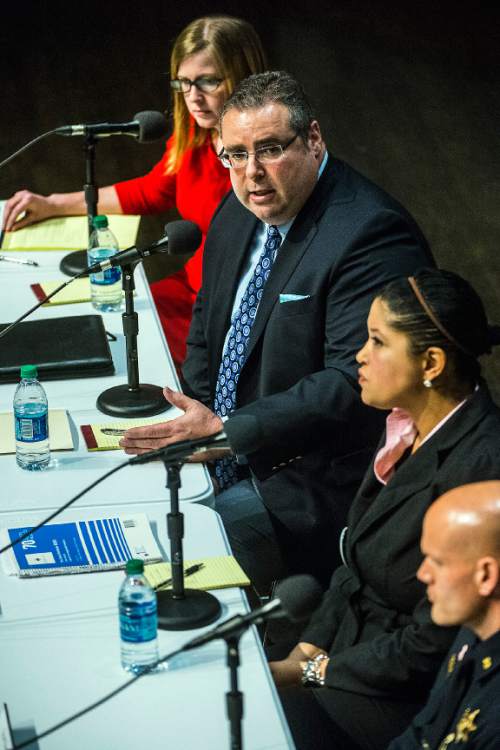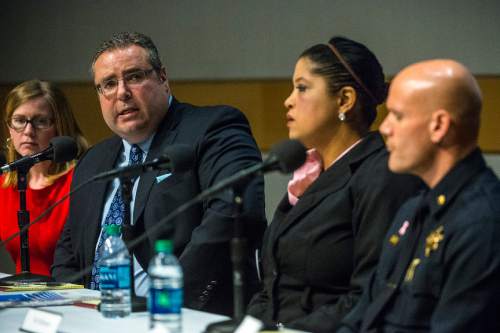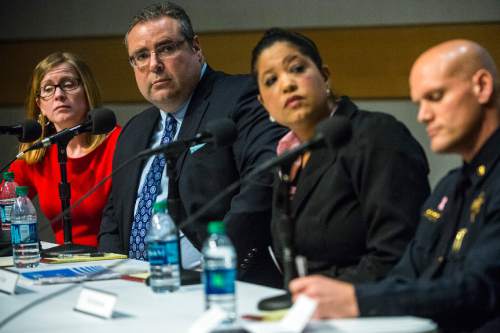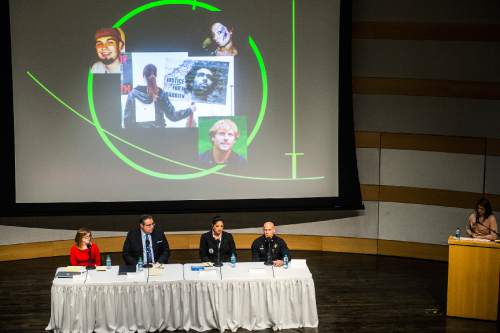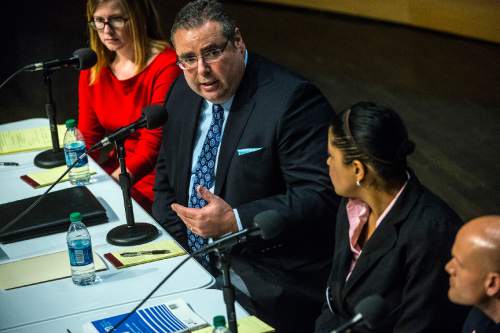This is an archived article that was published on sltrib.com in 2015, and information in the article may be outdated. It is provided only for personal research purposes and may not be reprinted.
Fourteen Utahns were killed by police in 2014. Four more have died since the first of the year at the hands of law enforcement. The complex question is: why?
Thursday evening, The Salt Lake Tribune held a town hall meeting to address the issue that has vexed the nation.
What became apparent Thursday is that there doesn't seem to be an easy answer.
About 150 people gathered in the Nancy Tessman Auditorium at the Salt Lake City Main Library to hear panelists — two from law enforcement, a citizen activist and a Tribune reporter — discuss positions on the use of lethal force.
Panelist and activist Lex Scott said police are not capable of policing themselves when it comes to investigation of officer-involved shootings. She called for creation of citizen review boards.
"We don't want the police investigating themselves anymore," the activist said. "They are finding themselves innocent and they have blood on their hands."
But West Valley Police Chief Lee Russo said members of the general public are not trained in criminal investigations.
"To come to the conclusion that we are covering things up is one heck of a conspiracy," he said.
He added that it is up to the office of the district attorney whether to charge a police officer in a shooting death.
The subject of police training was front and center as Tribune moderator Jennifer Napier-Pearce showed clips of officer-involved shootings, including that of 20-year-old Dillon Taylor outside a convenience store last summer near 2100 S. State St.
Taylor, who was not armed, died at the scene.
Both Russo and Scott Stephenson, director of the state's Peace Officer Standards and Training, said officers fear for their safety when responding to such calls of a "man with a gun," and can use lethal force when they believe their lives are threatened.
"There is a lack of understanding [by the public]," Russo said. "We have to address how police officers operate."
Stephenson said when police cannot see an individual's hands, they fear there could be a weapon.
Both men said that during a life-threatening situation, Tasers are not a good option because they have a high failure rate.
But Scott responded by saying policies for use of deadly force aren't succeeding.
"There is a lot of focus on protecting police lives," she said. "And little focus on protecting human lives."
The audience also saw a clip of James Barker, who was shot in Salt Lake City's Avenues neighborhood after he attacked an officer with a snow shovel. Many wondered why the officer did not attempt to de-escalate the situation that had begun quite calmly.
Stephenson noted that officers do receive 12 hours of training in de-escalation techniques.
Some in the audience were family members of people killed by police. The crowd often clapped for Scott and sometimes jeered the police officers.
Before the meeting, audience member Karla Reading said she was "sick at heart."
"I feel bad for those who get shot and I feel bad for the police officers who shot them," she said.
Ellen Wilson said ease of obtaining firearms puts police in a difficult position. "There are just too many guns," she said.
Police using deadly force, particularly on young people, is a concern for David Grunwald, who also attended the gathering. "Our children are precious," he said. "We need to make sure we don't accidentally kill young people."
The West Valley police chief told the audience that it is essential that police and the public continue to discuss the topic.
"There is an opportunity to have a dialogue about the future," Russo said. He cited such things as slavery, which Americans have overcome. "Only through dialogue have we been able to look back and say, 'How did we ever allow that?' "
Scott responded by saying that today, there are as many black Americans killed by police as were lynched during slavery.
"It's protect and serve," she said. "Not comply or die."
As the evening drew to a close, the discussion of police-involved shootings appeared to be far from over.


